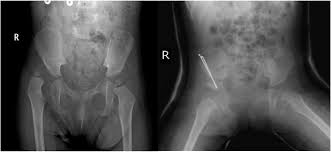Doctors have issued a stark warning about the increasing incidence of rare hip joint disorders among children aged 10-12, citing a concerning interplay of obesity, low vitamin D levels, and sedentary lifestyles as contributing factors. Slip Capital Femoral Epiphysis (SCFE), a potentially debilitating condition, poses a significant threat to children’s mobility and overall quality of life.
SCFE occurs when the ball at the top of the thigh bone slips backwards, causing pain, stiffness, and difficulty in walking. If left untreated, it can lead to severe limb impairments and joint destruction, necessitating invasive surgical interventions.
Early detection and intervention are critical to mitigating the long-term consequences of SCFE, according to medical experts. Dr. Sanjay Sarup, Director of Paediatric Orthopaedics and Spine Surgery at Artemis Hospitals, emphasizes the importance of recognizing warning signs such as limping, particularly in adolescents with obesity and vitamin D deficiency. Timely consultation can prevent the progression of the condition, reducing the need for extensive surgical procedures.
“Prevention is key,” asserts Dr. Sarup, advocating for initiatives to promote physical activity, combat obesity, and address nutritional deficiencies to lower the risk of SCFE development among children.
Treatment costs for SCFE vary depending on the severity of the condition, ranging from Rs 70,000 to Rs 80,000 for minor surgeries to Rs 2 to Rs 2.5 lakh for more extensive procedures. The condition can affect both hips, necessitating comprehensive care and prophylactic surgery on the opposite hip to mitigate risks.
Commenting on the challenges posed by SCFE treatment, Professor P.N. Gupta, a specialist in Children’s Orthopedics at Government Medical College, Chandigarh, underscores the complexities involved. “SCFE is a very difficult condition to treat,” he explains, highlighting the importance of expertise and experience in managing cases effectively. Complications can arise during both the natural course of the disease and its treatment, making it imperative to ensure optimal outcomes for affected children.
As cases of SCFE continue to rise, healthcare professionals emphasize the urgency of early detection, prevention strategies, and comprehensive care to safeguard children’s musculoskeletal health and well-being.











